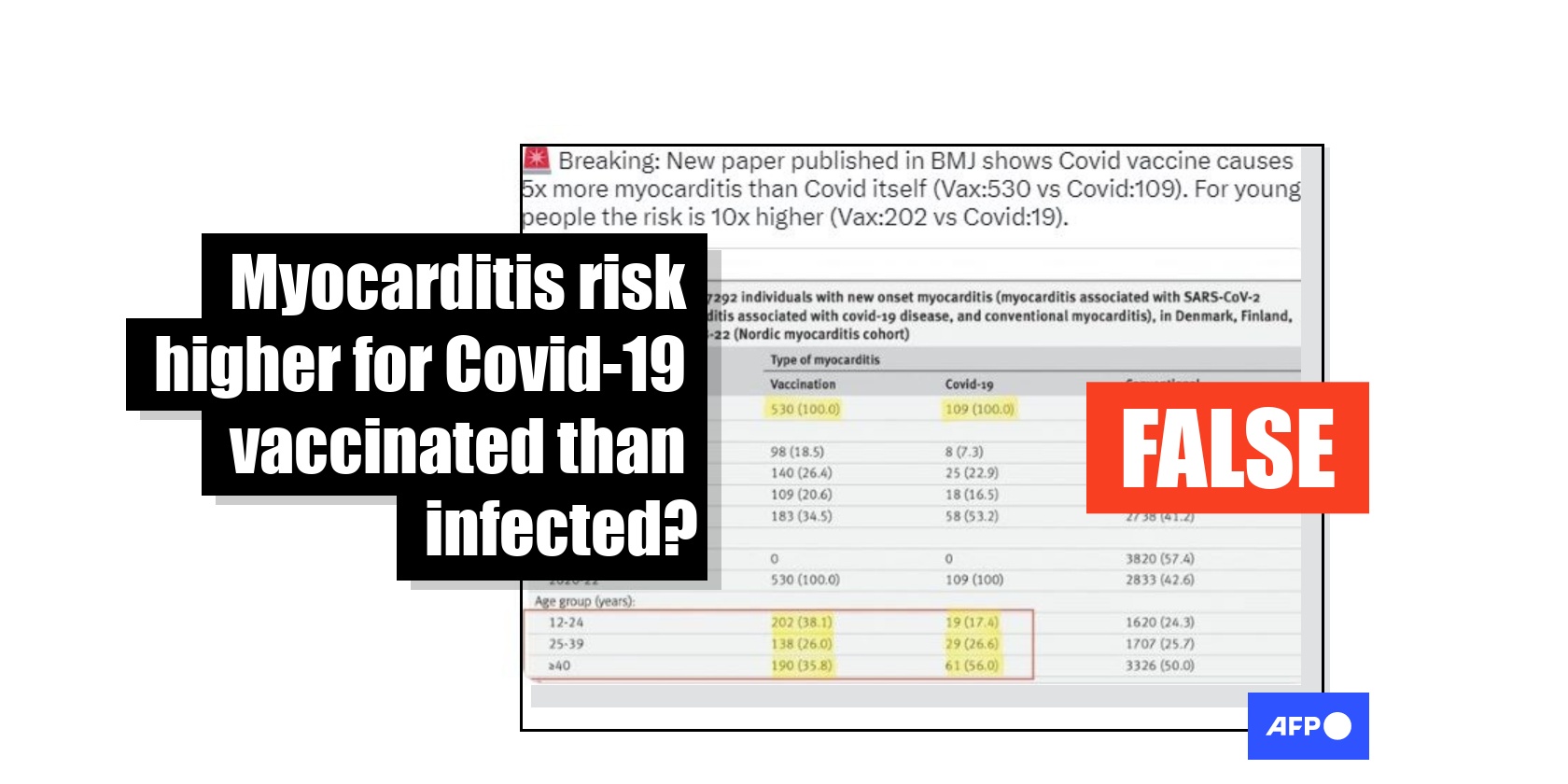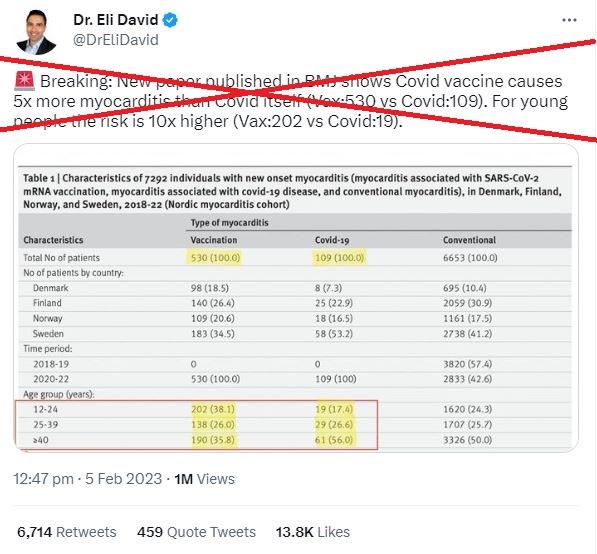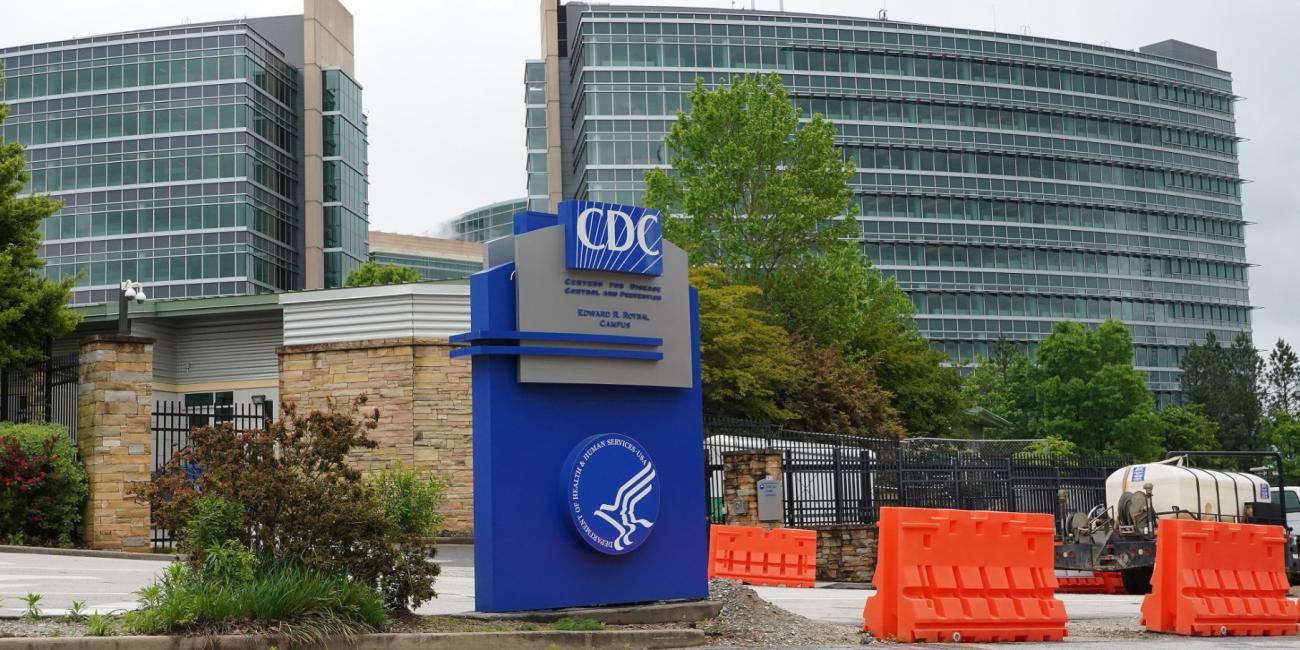
Posts misrepresent study on myocarditis, Covid-19 vaccines
- This article is more than three years old.
- Published on February 23, 2023 at 18:18
- 3 min read
- By Julie PACOREL, AFP France
- Translation and adaptation Rob Lever
"Breaking: New paper published in BMJ shows Covid vaccine causes 5x more myocarditis than Covid itself," says a February 5, 2023 tweet accompanied by a chart purporting to show data from a study. "For young people the risk is 10x higher."

The post accumulated tens of thousands of interactions. The same message was shared on Facebook and in French.
The post is among several claims that have spread online about the risk of myocarditis from Covid-19 vaccines. As evidence, it cites a study published in BMJ Medicine, an open-access journal that the British Medical Journal launched in 2021.
However, the paper did not seek to determine the risk of developing myocarditis.
"This is an incorrect way to use our study," Anders Husby of the Statens Serum Institute in Denmark told AFP. "Our manuscript does not calculate the 'risk of myocarditis' by different kinds of exposure. Our current manuscript investigates the clinical outcomes of myocarditis cases."
The Nordic study
The paper misleadingly shared online analyzed the rate of heart failure or death from any cause within 90 days of admission to the hospital for new onset myocarditis. Researchers reviewed the cases of 7,292 individuals in Denmark, Finland, Norway and Sweden.
"Compared with myocarditis associated with Covid-19 disease and conventional myocarditis, myocarditis after vaccination with SARS-CoV-2 (messenger RNA) vaccines was associated with better clinical outcomes within 90 days of admission to hospital," the authors concluded.
The social media posts, however, cite the percentages of each group within the study population to give a skewed impression of the relative risks.
For example, the sample included 530 people (7.3 percent) with myocarditis associated with mRNA vaccines and 109 (1.5 percent) with myocarditis associated with Covid-19 infection.
Ninety days after new onset myocarditis, 22 individuals (4.5 percent) in the former group and 12 (11 percent) in the latter were diagnosed with heart failure.
"We found that patients with myocarditis after vaccination had a significantly decreased risk of heart failure at 90 days after admission to hospital for myocarditis," the researchers said in the paper. "Conversely, we found a non-significant increased risk of heart failure at 90 days in patients with myocarditis associated with Covid-19 disease."
Myocarditis more common after infection
Although the Nordic study did not compare the myocarditis risk of infected and vaccinated individuals, other research has done so.
A European study published in 2022 found roughly 17 cases of myocarditis per 100,000 men aged 18 to 24 who received the Moderna vaccine and five cases per 100,000 for those who got the Pfizer shot. Meanwhile, the US Centers for Disease Control and Prevention (CDC) and the World Health Organization (WHO) say those who contract the coronavirus are at a much higher risk for myocarditis.
One study showed a higher risk of myocarditis for those who had been infected, except for males under 40. A meta-analysis published in August 2022 found the risk of myocarditis "is more than seven-fold higher in persons who were infected with the SARS-CoV-2 than in those who received the vaccine."
The researchers also concluded that "the outcomes of myocarditis after vaccination were less severe than for other types of myocarditis."
France has limited Moderna vaccines for those under age 30 due to a statistically higher incidence of myocarditis. But health authorities worldwide continue to recommend Covid-19 vaccines; the CDC and the WHO say the benefits outweigh the known risks.
"Looking at the risks, the benefits of vaccination are not in doubt for women and men over age 30, and the data on myocarditis since summer 2021 certainly does not mean we should stop vaccinating men under 20 or 30 years of age, who still benefit from a decline in serious events links to Covid," said French cardiologist Florian Zores in a blog post.
More of AFP's reporting on vaccine misinformation can be found here.
Copyright © AFP 2017-2026. Any commercial use of this content requires a subscription. Click here to find out more.
Is there content that you would like AFP to fact-check? Get in touch.
Contact us




